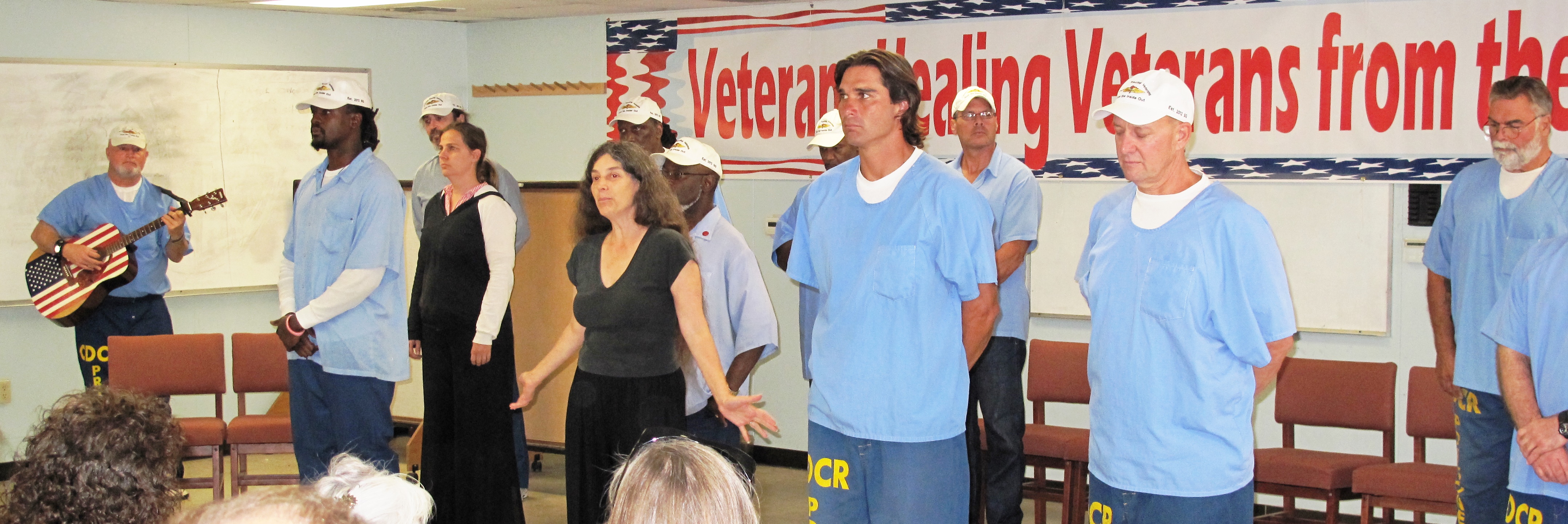Rehabilitative arts programs expand to 18 state prisons
CDCR, California Arts Council announce this year’s funding recipients
Photos and story by Krissi Khokhobashvili, CDCR Public Information Officer
The arts have long been a catalyst for communication and human growth, from etchings on cave walls to magnificent paintings on chapels to plays whose themes allow vastly different audiences to find common ground.
The return of Arts-in-Corrections to state prisons has enabled professional artists throughout California to share their skills with inmates, teaching new techniques and skills while also encouraging communication and creativity. Arts-in-Corrections is a partnership of the California Department of Corrections and Rehabilitation (CDCR) and the California Arts Council (CAC) to bring structured, rehabilitative arts programming inside the walls of state prisons.
Now in its second year, Arts-in-Corrections offers programs in painting, drawing, theater, music, dance and writing, all with a focus on the healing power of art and how artistic skills can translate into valuable life and job skills.
“Since the revitalization of the Arts-in-Corrections program, many positive changes have been reported from our institutions,” said CDCR Secretary Jeff Beard. “These rehabilitative arts programs are teaching inmates new skills while also providing an outlet for emotional growth and self-reflection.”
One of the 10 organizations to receive funding this year is the Marin Shakespeare Company, which for 12 years has brought theater to San Quentin State Prison (SQSP), teaching inmates not only the process of staging a full-length Shakespeare production, but also empowering incarcerated men to express themselves in positive ways.
This year, under the direction of Marin Shakespeare’s Lesley Schisgall Currier and Suraya Keating, SQSP inmates from the group Veterans Healing Veterans from the Inside Out created an autobiographical play exploring the challenges of returning home from military service, and why so many veterans commit suicide.
“It takes a lot of courage to participate in the military, particularly in combat,” Currier said. “It takes another kind of courage to stand up in front of a group and tell your story in this way.”
The men presented their play, “Theater of War,” to an audience of staff, fellow inmates and representatives from outside veterans’ organizations. The audience was openly moved by the performance, which drew on the men’s own experiences to paint a portrait of what it’s like to transition from service to society, and to be a veteran in prison.
“I have been in those shoes – I understand those shoes. I’ve felt what they are feeling,” said Ava-Marie Jones, a Disabled Veteran Outreach Program Representative for the California Employment Development Department. “I can understand where you guys are. I see people like you every single day – I respect what you have just done, in the realm of who you are.”
“Theater of War” tackled issues from life-changing and tragic decisions made during combat and reuniting with family after war to the challenges of dealing with mountains of benefit paperwork. Ron Self, a decorated Marine incarcerated at San Quentin, founded Veterans Healing Veterans in 2012 to provide a safe space for incarcerated veterans to deal with those issues and many more.
“I’ve never participated in something where I can actually say I know people who said they didn’t commit suicide because of a program, and that has happened in this program,” Self shared during a Q&A after the performance.
“This program has been a way for me to help express myself,” said Isiah Daniels, “and to help those outside the military understand who I am.”
Several cast members did not have prior military experience, but volunteered their time to help the cause. Currier said although it was a learning curve for non-military members, including herself, it was ultimately healing for all involved, and created a deeper understanding of incarcerated veterans.
“Hearing these stories, and knowing that there are many more stories, and being able to help be the catalyst for the catharsis that can happen when we share our stories, is why I’ve been coming to this prison every week,” Currier said.
San Quentin is not the only prison Currier and other volunteers travel to. For the better part of nine months, she and drama therapist Lynn Baker spent Saturdays with inmates at California State Prison-Solano (SOL) in Vacaville, preparing for the prison’s first-ever Shakespeare productions. Their work culminated in two performances, “Macbeth” and “Julius Caesar,” and the Shakespeare at Solano program has been re-funded so its work can continue. Sign-ups for the next productions will begin in August.
“Growing up, I’d never been a part of anything like this before. I always wanted to do something that was considered ‘regular,’” said Joseph Jackson, who portrayed Mark Anthony in “Caesar,” adding that it was a big challenge to get up on stage and perform. “This gives me an opportunity to put myself out there, push through that fear and just do the best that I can.”
The Shakespeare program starts with several weeks of reading and analyzing the plays, teaching participants about the language and stagecraft of William Shakespeare. Even though the plays were written hundreds of years ago, the men in the program were quickly able to draw parallels between centuries-old scenes and their current situations.
“This is the first time that I’ve ever stood on the outside of a murder or betrayal and actually had a chance to consider and think deeply about it,” shared Donel Johnson, who played Cicero. “Sometimes, when you’re in the midst of certain things, you don’t really process it because you’re a part of it … when we can actually look at crimes like that, actually think about how wrong that is, that’s a powerful thing.”
“I believe that we all have darkness inside of ourselves, and that we all as human beings benefit from being able to express ourselves and to find our creative selves, whether it’s as a visual artist or an actor or a musician,” Currier said. “And the world’s a better place when we can let our creativity and our ability to communicate flourish.”
(Editor’s note: Some websites may not be accessible from a CDCR computer.)
Arts-in-Corrections Service Providers
- Actor’s Gang
- Comedia del’ arte theater
- Alliance for California Traditional Arts (ACTA)
- Mexican Jarocho music, African drumming, Native American beadwork, African-American storytelling, and Chicano theater and guitar
- Dance Kaiso
- Caribbean dance and percussion
- Fresno Arts Council (in partnership with Kern County Arts Council)
- Visual arts, music, creative writing and theater
- Inside Out Writers
- Creative writing
- Marin Shakespeare Company
- Theater
- Muckenthaler Cultural Center
- Music, visual arts, and theater
- Red Ladder Theatre Company / Silicon Valley Creates
- Improvisational theater
- Strindberg Laboratory
- Theater
- William James Association
- Visual arts, creative writing, and music
To learn more about Arts-in-Corrections, visit http://arts.ca.gov/initiatives/aic.php.




